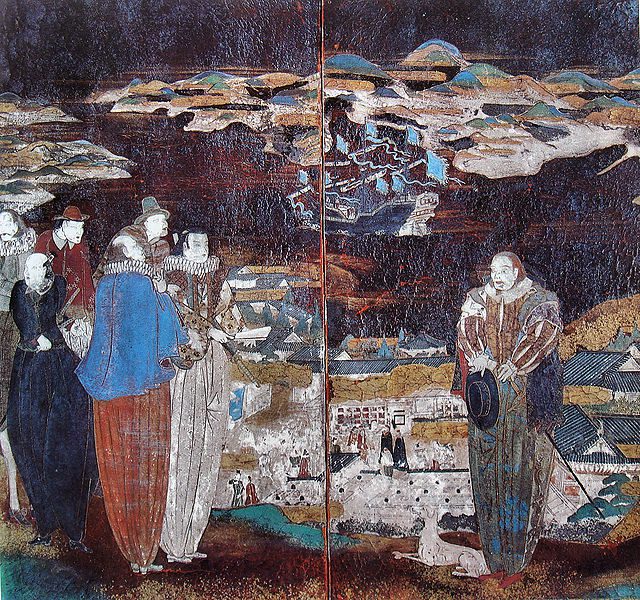
Japanese Christians In Portugese Costume (17th century painting) [public domain / Wikimedia Commons]
***
[spoilers in the latter part of this article. I clearly indicate when they start to appear]
***
I don’t do true movie reviews (hence my quotation marks). I leave that to the experts, since it is primarily an artistic thing and that’s not my area. When a film is touches upon theological and spiritual themes, however, I usually have some thoughts on it, as a Catholic apologist. And I do in this instance. Here are my reactions and reflections, fresh from seeing the film.
*****
Silence is a grueling examination of what persecution does to Christians (i.e., interiorly, emotionally), and about the apostasy that sometimes is a result of that. Whenever persecution sets in, there are always three types of Christians (sort of like the parable of the sower):
1) Those who immediately cave in; cowards; weaklings.
2) Those who agonize and realize the sublime gravity of the situation. They might go either way, depending on the level of pressure and various other factors (temperamental, health, etc.).
3) Those who have heroic faith and achieve a glorious martyrdom and witness for Christ.
We go through that in daily life to a much lesser extent, but in an analogous way. If the faith is being mocked at our workplace, for example, do we laugh along, as spineless wimps; or feel very uncomfortable and troubled and conflicted, and make some kind of protest, however feeble; or do we directly confront it and take a principled public stand, which will cost us?
The film deals with these sorts of things, and also the apostasy that is a live possibility in these horrible scenarios. Priests in 17th century Japan were subjected to truly extraordinary pressures of brainwashing, psychological torture, and coercion (if the movie is accurate in this regard). We must take that into consideration, if they don’t always act heroically. I wrote earlier, before having seen it: “It depends on how the whole thing is portrayed. There are such things as apostates. In any event, none of us know how we would act under threat of torture.”
I also wrote earlier today:
To portray apostasy, in and of itself is not necessarily trying to glorify it, or being slanted. But perceptions of whether or not a portrayal is excessive or bad cinema or slanted in some way are themselves subjective. That makes movies, like music, fun to discuss.
How a Christian acts under persecution is a legitimate dramatic theme. I don’t see it as immediately objectionable for a movie to show that that happens in the real world.
Theologians and apologists like myself, after all, write about and explain ‘sinners in the Church’ as a thing we should expect (referred to in the Bible): so we shouldn’t be shocked to actually find some, or to see it portrayed in a movie. If this one shows good examples of faithful Catholics, too, then I think it can be considered ‘fair’ in terms of cinematic portrayal.
Having now seen it, I don’t believe that it is trying to glorify apostasy, but rather, it simply shows what people went through in these horrible situations. Not all will pass the test, and it’s absurd for us to sit in our easy chairs and judge them. I’m not saying they were right, or trying to excuse or rationalize what they did (as secularists will often do). Christians ought to be willing to be martyrs if it comes to that. But we need to understand what they went through. Causes are not justifications, if sin is involved, but they are prior causes, to be considered.
The movie did indeed show many inspiring faithful Catholics, willing to suffer for their faith and to become heroic martyrs. Not every movie has to exclusively dramatize that. Plenty of “old-time” Christian movies do. There is also a place to explore the horrors of persecution on a human, emotional level: what the constant fear of it does to people.
Yes, we can do all things through Christ, Who strengthens us: including enduring torture and death. But some (many?) Christians will not have that strength when the terrible time of decision comes for them. They haven’t cultivated it enough in their spiritual life — haven’t allowed God’s grace to fully work in them — before their “hour” comes.
This film helps us sympathize with what persecuted Christians go through, and is very useful in that regard. The more we can relate to those struggles, the better. Christians are being slaughtered right now all over the world.
I would also suggest that this film is not for those who have considerable struggles of faith and doubt. It might actually be traumatic. Professor of theology Monica Migliorino Miller made a similar observation in her review in Crisis Magazine:
Silence should also not be seen by the young, or those whose faith is not strong as the theology in this movie is complex, clever and seductive. However, if you are a mature Christian looking for a finely crafted, well-acted, disturbing film that provokes thinking and debates—then Silence is for you.
I’ve written similarly about the Harry Potter movies, saying that if one doesn’t have a strong Christian faith, there is significant danger there of being possibly drawn into the occult (as I was in my early life), to fill the spiritual void. But if one is strong in the faith; well-educated, they pose little or no danger, and are understood as being fantasies: not that essentially different from the classic fairy tales.
The film has one scene where Jesus is speaking (a “voice from heaven”), which is of dubious theology, but not in my opinion indisputably heretical. I don’t personally believe (from all I know of theology) that God would say it.
Facebook friend Andréa Cristin Gianna Liceaga (what a beautiful, “musical” name!) made an observation in the previous thread here, that I agree with: “From what I’ve read it’s basically just telling a story, that no doubt happened in varying ways to countless Christians over the centuries, and it’s worth seeing and reflecting on.”
Yes it is. It’s good to become more familiar with such stories (both of martyrdom and apostasy), since we are so unfamiliar with persecution and this sort of “dramatic” apostasy. Most apostasy in our culture is of a very “cool” and detached and cynical variety: living as if God didn’t exist and as if Christianity has no bearing on one’s life: i.e., much like my own life from the ages of 9-18, having ceased attending the nominal Methodist church of my early childhood. It’s much more sheer ignorance or apathy rather than direct renunciation.
So we need to observe what many Christians now and in the past have had to endure, and try to put ourselves in their places, and do some serious soul-searching. Films like this provide excellent opportunities to do that.
Bishop Robert Barron made a great comment that I agree with, too, and see as a potential danger of the film (or at least how more secular folks might view it):
My worry is that all of the stress on complexity and multivalence and ambiguity is in service of the cultural elite today, which is not that different from the Japanese cultural elite depicted in the film. What I mean is that the secular establishment always prefers Christians who are vacillating, unsure, divided, and altogether eager to privatize their religion.
That gets back to my earlier statement, recommending that those who are weak in the faith should not see the film. If we are strong in the faith, we know full well that there are plenty of weak, ineffectual Christians (and Catholic Christians), barely hanging on.
That shouldn’t make us doubt the faith at all. Rather, it shows us the rebelliousness and sinful weakness of human beings. The proper response, then, is to redouble our efforts to spread the faith and its hopeful, joyful message (and the rationale for the faith: my area), complete with the grace and power to live the Christian life, if only we would fully resolve ourselves to do so, led by the Holy Spirit within us.
It’s all in how one looks at it. Doubt and pessimism are ultimately child’s play: the easiest and most natural thing in the world to do, according to our flesh, the world, and the devil. Having faith requires guts and strength, and is the courageous adult thing. Someone said that we have no idea of the whole power of the devil until we start resisting him. Very true. If we’re already playing his game, he is getting what he wants with no effort. So we fall back on God’s grace and His strength and pick ourselves up, resist the devil, and resolve to do better.
Further comments originally posted on Facebook (SPOILER ALERT!!!)
Granting that Christ could have said what He did (I said I think not, but I wasn’t dogmatic — in the theological sense — about it), I didn’t see that as volunteering for damnation, or even necessarily apostasy. He got permission “from the top” to do what normally a Christian would never consider doing (in a non-coercive setting): to help the others; and compassion was the motive. So unless we have a scenario of God telling someone to damn himself (which I would think is quite inconceivable), then that isn’t what happened there.
St. Paul states in Romans 9:3 (RSV): “For I could wish that I myself were accursed and cut off from Christ for the sake of my brethren, my kinsmen by race.”
At first glance, that looks like the notion of sacrificial damnation for the sake of others. But in the final analysis, I don’t think God wants that or would allow it for anyone. It makes no sense for someone to be separated from God for eternity, just so others can be with him. Our very purpose is ultimately to be in union with God for eternity.
So I interpret this as an emotional anguish from Paul, and indicative of his deep love, but not that he thinks his own damnation would or should literally happen. Moses expressed similar sentiments:
Exodus 32:32-33 But now, if thou wilt forgive their sin — and if not, blot me, I pray thee, out of thy book which thou hast written.” [33] But the LORD said to Moses, “Whoever has sinned against me, him will I blot out of my book.
Note how God there almost “vetoes” Moses’ wish and says that each sinner stands accountable for himself at the Judgment. The Navarre Commentary explains both passages in the way I would have suspected:
3. There is an apparent contradiction between what is said here — “I could wish that I myself was accursed and cut off from Christ” — and what is said earlier (cf. 8:31ff) about nothing being able to separate us from the love of Christ. The two ideas in fact complement one another. God’s love moves us to love others so intensely that we are ready to suffer anything if it means the conversion of others to God.
Paul is not referring to permanent separation from God, that is, eternal damnation, but to being ready to renounce any material or spiritual favour God might grant us. This means that we should be ready to bear public opprobrium and be taken for evildoers, as Jesus was.
Some writers have interpreted the verse as meaning that the Apostle is even ready to renounce eternal happiness, but obviously what we have here is typical oriental exaggeration, rather like what Moses said when he interceded with God on behalf of those Israelites who had fallen into idolatry: “[If thou wilt not forgive their sin] blot me, I pray thee, out of thy book which thou hast written” (Ex 32:32).
Both Moses and Paul know that God loves them and protects them and that the vision of God necessarily involves the indescribable happiness of heaven, but they want to make it plain that they put the salvation of the chosen people ahead of their own personal advantage.
Nor was that act (permission or no), necessarily a willful apostasy. There was good motivation, and it was mixed with the weakness and vulnerability of the moment: after who knows how long a period of intense brainwashing and psychological torture. I took it that there was a process involved, that the movie didn’t delve into (just as it didn’t with the Liam Neeson character). I assume that the book did that. I hope it did, because it needs to be explored within the whole story framework.
My own theory is that the apostasy (incomplete or complete) of both priests was largely due to difficulties in understanding why a nation like Japan could so thoroughly reject the gospel, and trying to make sense of other religions: their purpose, and how much may be true in them (very deep and difficult questions indeed; in Catholic lingo: “no salvation outside the Church”).
This is the danger in the liberal sort of what I call “ersatz ecumenism”: which isn’t for the purpose of rejoicing in actual common ground and seeking to bring folks to Catholicism (authentic and orthodox Vatican II ecumenism), but rather, presupposes indifferentism and the essential equality (or relativity) of all religions from the get-go.
In replying to someone who said the film wasn’t worth seeing, I wrote:
It’s a discussion whether someone who is not altogether orthodox or consistent in their walk with the Lord has any good insight to offer at all. I say that he or she does.
If we required all artists and musicians to be perfect saints and perfectly orthodox in order to listen to their music, we’d have very little of the best art. That was precisely the central theme of the (purported) Mozart biography, Amadeus. I know a lot about the great composers, as an avid classical music buff. Beethoven was a nominal Catholic at best, and no celibate (he never married). Wagner was an anti-Semite. Schubert died of venereal disease. Debussy and Brahms were atheists, and Brahms liked to frequent the whorehouses of Vienna. One could go on and on. Only a few of the greatest composers were really devout Christians (Bach and Bruckner being notable examples).
I’m inspired by the old Christian movies as much as anyone. But it doesn’t follow that this film has nothing to offer. Truth is truth wherever it is found: in art as well as theology. As I said in my original “review”, there is also much in the movie about heroic faith and martyrdom.













